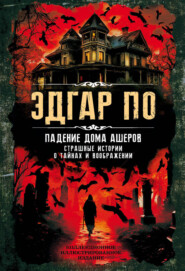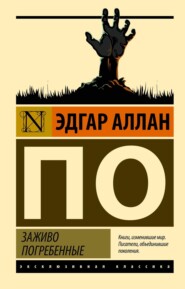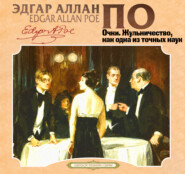По всем вопросам обращайтесь на: info@litportal.ru
(©) 2003-2024.
✖
Золотой жук. Уровень 1 / The Gold-bug
Настройки чтения
Размер шрифта
Высота строк
Поля
All witnesses agreed that the chimneys of all the rooms on the fourth floor were too narrow for anyone to escape.
Paul Dumas, a doctor, was called to see the bodies soon after they were found. They were in a horrible condition. Such results could not come from a woman’s hands, only from those of a very strong man. The daughter was strangled by strong hands around her neck.
That’s all the police knew. This was the strangest killing in Paris of all time.
Later, we read in the paper that the police arrested and imprisoned Adolphe Le Bon, although nothing appeared to criminate him. I could tell that Dupin was interested in the progress of this affair. He asked my opinion on the murderers. I said I saw no means by which it would be possible to trace the murderer.
“We must not judge of the means,” said Dupin, “the Parisian police is famous for its acumen. They have a vast parade of measures but, for the most part, they achieve results by simple diligence and activity. When these qualities are useless, their methods fail. There is such a thing as being too profound. If you look at an object too close your vision may become poor; you lose sight of the matter as a whole. Truth is not always deep in a well. In fact, I do believe that she lies on the surface. Let us go to the house and see what we can see. There must be an answer.”
We got permission and proceeded at once to the Rue Morgue.
It was late in the afternoon when we reached the house on the Rue Morgue. There were still many curious people; they were gazing up at the closed shutters. Before going in the house, we inspected the outside. Dupin carefully examined the street as well as the house. Then we entered the house. Dupin looked with great care at everything, at the bodies, the walls, the fireplace, the windows. I saw nothing new beyond what the paper told us. We examined all the rooms until dark and then went home. On our way home, my friend stepped in for a moment at the office of one of the daily papers.
It was his humor, now, to decline all conversation about the murder, until about noon the next day. Then he suddenly asked me if I saw anything peculiar at the crime scene[2 - at the crime scene – на месте преступления]. Something in his manner made me shudder, I don’t know why.
“No, nothing peculiar,” I said; “nothing more, at least, than we both read in the paper.”
“Let’s forget about the paper. Everyone seems to be puzzled by the unusual nature of this crime. It seems there is no motive for such brutal killing. It also seems impossible that there were people talking upstairs while the police inspected the first floor, as there is no way for anyone to escape. The question here is not ‘what happened’ but ‘what happened that has never happened before’[3 - what happened that has never happened before – что случилось такого, чего никогда не случалось раньше]. In fact, the most mysterious details of this case for the police led me to the answer.”
I stared at him in mute astonishment.
“I am now waiting”, he continued and looked toward the door of our apartment, “for a person who might be blamed for what happened; through I believe he is innocent for the worst portion of the crime. I look for the man here-in this room-every moment. He may not arrive but the probability is that he will. When he comes, we must detain him. Here are pistols; and we both know how to use them if necessary.”
During his monologue, his voice was so loud as if he was speaking to someone at distance. I took the pistols hardly realizing what I was doing. He continued:
“Now think about the voices upstairs; it was proved they were not the voices of the women. It shows that the old lady could not kill her daughter first and then commit suicide. I speak of this point mostly for the sake of method; it would be simply impossible for her to do such damage to her daughter and herself, as she is not that strong. The voices were of a third party. Now, did you notice anything peculiar in what people said about those voices?”
I remarked that, while all the witnesses agreed that the gruff voice belonged to a Frenchman, there was much disagreement about the shrill one.
“That was the evidence itself,” said Dupin, “but it was not the peculiarity of the evidence. You observed nothing distinctive. Yes, everyone agreed about the gruff voice being of a Frenchman, and everyone disagreed about the shrill voice. The strange thing is that when an Italian, an Englishman, a Spaniard, and a Frenchman tried to describe it, each one spoke of it as that of a foreigner. Each is sure that it was not the voice of one of his own countrymen. Now, how strangely unusual must that voice have really been![4 - Now, how strangely unusual must that voice have really been! – Насколько же необычен был этот голос!] People recognized several European languages in its tone – but not a single word.
“I don’t know what you think now. But I believe these facts are enough to lead us to the only possible answer… I will not say it yet.
“Let us now take ourselves again, in our thoughts, to this chamber. What shall we first seek here? All possible ways for murderers to escape. The police examined the floors, the ceilings, and the masonry of the walls, in every direction. But I don’t trust their eyes so I examined the house with my own.
“There were no secret doors. The opening above the fireplace is not big enough for even a large cat. There is only one way to escape left. The windows. Now, this may not seem possible. We must prove that it is possible.
“There are two windows in the room. One of them is wholly visible; the lower part of the other is hidden by furniture. Both of them are made of two parts; to open the window one must lift up the bottom half. I looked carefully at the first of these windows. It was firmly closed, fastened from within[5 - from within – изнутри]. In its frame to the left, I discovered a very stout nail. The nail held the window closed. When I examined the other window, I discovered a similar nail in it. No one could raise the window when the killings were discovered. I, too, tried to raise the window and could not. This convinced the police there was no possibility of escape through the windows. But I knew what seemed impossible must be proved to be possible.
“I proceeded to think. If the murderers – or the murderer – escaped through one of the windows, the windows must have the power of fastening themselves. I put off the nail from the first window. Then I carefully felt the window and finally discovered the hidden spring. I pressed it and the window opened easily. But when I put the nail back in, it again was impossible to open the window. Now I knew no one could escape from that window.
“I went to the second window. There was a similar looking nail in it and a spring. Without touching the nail, I pressed the spring and tried to raise the window. Up it went! Turned out, that the nail was broken and only looked like it held the window tightly. And the spring was that mechanism that let the window to fasten itself.
“Now we proved the murderer (I am now sure there is only one murderer) indeed escaped through that window.”
“But, Dupin,” I interrupted him, “the windows are on the fourth floor, far above from the ground. How could someone…”
“Yes, that is an interesting question: how did the murderer go from the window down to the ground? When we walked around the house, I noted a lightning rod that went from the top of the building to the ground. It is a way for someone to go up or down the wall, and then to go inside and outside the house. Although that someone must be extremely strong. The only question left – who?”
I had some vague hunches about where Dupin was leading me but I was unable to see the answer. He continued his discourse:
“Now let’s think of motive. Do you remember in what condition the room was found? There was the wildest possible disorder. The murderer threw clothes around the room but, it seemed, did not take any of it. One of the witnesses mentioned that the old lady took home a large amount of money from the bank three days before the killing. That money was found, in bags, on the floor. The murderer must be an idiot if he attempted to rob these poor ladies and took nothing from them eventually!
“What do we have in the dry rest?[6 - What do we have in the dry rest? – Что мы имеем в сухом остатке?] The peculiar voice, an unusual agility, a startling absence of motive in a singularly atrocious murder. Let us glance at the butchery itself. A girl is strangled to death by manual strength, and thrust up a chimney, head downward. Ordinary assassins do not do that. Other indications of a great strength the murderer must had have are very thick tresses of grey human hair on the hearth. They were torn out by the roots. The throat of the old lady was not merely cut, but the head absolutely severed from the body: the instrument was a mere razor. Something here does not fit our ideas of human actions, even when we think of men of the most terrible kind. Who would commit the murder in such brutal way without a reason? Who could have such incredible strength?”
“A madman!” I exclaimed, “Some raving maniac!”
“In some ways,” he replied, “your idea is not irrelevant. But madmen are of some nation. Their cries may be terrible, but they are made of words, and some of the words can be understood. Besides, look at the hair I hold in my hand. I took it from rigidly clutched fingers of Madame L’Espanaye. Tell me what you can make of it.”
“Dupin!” I said, completely amazed; “this hair is most unusual-this is no human hair.”
“Before we decide this matter, I want you to look at the little sketch I made. It is a picture of the marks on the daughter’s neck.”
My friend spread out the paper upon the table before us. “You see”, continued he, “there is no slipping apparent. The victim was killed by a firm and fixed hold. Now try to place all your fingers, at the same time, in the respective impressions as you see them.”
I tried and failed.
“Maybe we are not doing this in the right way?” said Dupin. “The paper is spread out on the table; but the human throat is cylindrical. Here is a piece of wood as big as a neck. Try to wrap your hand around it.”
I did so; but the difficulty was even more obvious than before. “This,” I said, “is the mark of no human hand.”
“Read now,” replied Dupin, “this passage from Cuvier.”
It was a detailed anatomical description of the large fulvous orangutan of the East Indian Islands. Goosebumps ran down my spine. The great size, the strength, the wildness of these animals are well known[7 - well known – хорошо известны]. Suddenly, all hit me at once: the color of the hair… the size of the hand… the terrible strength… the wildness of the killings… a mysterious voice that spoke a language no one could understand…
“But, Dupin!” I said, “There were two voices! If one was of an orangutan, the other was unquestionably the voice of a Frenchman.”
“True; and you will remember that, by the evidence, the voice said “My God!” in French. I built my hopes of a full solution of the riddle upon these two words.
“The witnesses described the way in which these words were said as an expression of horror. This means that a Frenchman knew about these murders. I am sure he did not participate in the bloody killing itself. The orangutan probably run from him. He traced it to the chamber but failed to recapture it. These are my guesses and I have no right to call them more. But if the Frenchman is indeed, as I suppose, innocent, he will come here tonight. Read this. I have put this advertisement in the newspaper.”
He handed me a paper, and I read thus:
CAUGHT – Early in the morning of the – (the morning of the murder): a very large orangutan. The owner, who is known to be a sailor, may have the animal again if he can prove it is his.
“How do you know he is a sailor?” I asked.
“I do not know and I’m not sure of it. I found a small piece of ribbon at the foot of the lightning rod. Look at this knot. Only few besides sailors can tie this knot.”
“But why do you think he would reply to your advertisement?”
“Because he would want to avoid extra attention for he, which follows from the paper, is known as an owner of the orangutan. He would think: ‘I will answer the advertisement, get the orangutan, and keep it close until it’s over.’”
At this moment, we heard a step on the stairs.
“Be ready,” said Dupin, “with your pistols, but neither use them nor show them until at a signal from myself.”
Dupin left the front door of the house open. The visitor entered the house and made several steps up the stairs. Then he stopped.
Paul Dumas, a doctor, was called to see the bodies soon after they were found. They were in a horrible condition. Such results could not come from a woman’s hands, only from those of a very strong man. The daughter was strangled by strong hands around her neck.
That’s all the police knew. This was the strangest killing in Paris of all time.
Later, we read in the paper that the police arrested and imprisoned Adolphe Le Bon, although nothing appeared to criminate him. I could tell that Dupin was interested in the progress of this affair. He asked my opinion on the murderers. I said I saw no means by which it would be possible to trace the murderer.
“We must not judge of the means,” said Dupin, “the Parisian police is famous for its acumen. They have a vast parade of measures but, for the most part, they achieve results by simple diligence and activity. When these qualities are useless, their methods fail. There is such a thing as being too profound. If you look at an object too close your vision may become poor; you lose sight of the matter as a whole. Truth is not always deep in a well. In fact, I do believe that she lies on the surface. Let us go to the house and see what we can see. There must be an answer.”
We got permission and proceeded at once to the Rue Morgue.
It was late in the afternoon when we reached the house on the Rue Morgue. There were still many curious people; they were gazing up at the closed shutters. Before going in the house, we inspected the outside. Dupin carefully examined the street as well as the house. Then we entered the house. Dupin looked with great care at everything, at the bodies, the walls, the fireplace, the windows. I saw nothing new beyond what the paper told us. We examined all the rooms until dark and then went home. On our way home, my friend stepped in for a moment at the office of one of the daily papers.
It was his humor, now, to decline all conversation about the murder, until about noon the next day. Then he suddenly asked me if I saw anything peculiar at the crime scene[2 - at the crime scene – на месте преступления]. Something in his manner made me shudder, I don’t know why.
“No, nothing peculiar,” I said; “nothing more, at least, than we both read in the paper.”
“Let’s forget about the paper. Everyone seems to be puzzled by the unusual nature of this crime. It seems there is no motive for such brutal killing. It also seems impossible that there were people talking upstairs while the police inspected the first floor, as there is no way for anyone to escape. The question here is not ‘what happened’ but ‘what happened that has never happened before’[3 - what happened that has never happened before – что случилось такого, чего никогда не случалось раньше]. In fact, the most mysterious details of this case for the police led me to the answer.”
I stared at him in mute astonishment.
“I am now waiting”, he continued and looked toward the door of our apartment, “for a person who might be blamed for what happened; through I believe he is innocent for the worst portion of the crime. I look for the man here-in this room-every moment. He may not arrive but the probability is that he will. When he comes, we must detain him. Here are pistols; and we both know how to use them if necessary.”
During his monologue, his voice was so loud as if he was speaking to someone at distance. I took the pistols hardly realizing what I was doing. He continued:
“Now think about the voices upstairs; it was proved they were not the voices of the women. It shows that the old lady could not kill her daughter first and then commit suicide. I speak of this point mostly for the sake of method; it would be simply impossible for her to do such damage to her daughter and herself, as she is not that strong. The voices were of a third party. Now, did you notice anything peculiar in what people said about those voices?”
I remarked that, while all the witnesses agreed that the gruff voice belonged to a Frenchman, there was much disagreement about the shrill one.
“That was the evidence itself,” said Dupin, “but it was not the peculiarity of the evidence. You observed nothing distinctive. Yes, everyone agreed about the gruff voice being of a Frenchman, and everyone disagreed about the shrill voice. The strange thing is that when an Italian, an Englishman, a Spaniard, and a Frenchman tried to describe it, each one spoke of it as that of a foreigner. Each is sure that it was not the voice of one of his own countrymen. Now, how strangely unusual must that voice have really been![4 - Now, how strangely unusual must that voice have really been! – Насколько же необычен был этот голос!] People recognized several European languages in its tone – but not a single word.
“I don’t know what you think now. But I believe these facts are enough to lead us to the only possible answer… I will not say it yet.
“Let us now take ourselves again, in our thoughts, to this chamber. What shall we first seek here? All possible ways for murderers to escape. The police examined the floors, the ceilings, and the masonry of the walls, in every direction. But I don’t trust their eyes so I examined the house with my own.
“There were no secret doors. The opening above the fireplace is not big enough for even a large cat. There is only one way to escape left. The windows. Now, this may not seem possible. We must prove that it is possible.
“There are two windows in the room. One of them is wholly visible; the lower part of the other is hidden by furniture. Both of them are made of two parts; to open the window one must lift up the bottom half. I looked carefully at the first of these windows. It was firmly closed, fastened from within[5 - from within – изнутри]. In its frame to the left, I discovered a very stout nail. The nail held the window closed. When I examined the other window, I discovered a similar nail in it. No one could raise the window when the killings were discovered. I, too, tried to raise the window and could not. This convinced the police there was no possibility of escape through the windows. But I knew what seemed impossible must be proved to be possible.
“I proceeded to think. If the murderers – or the murderer – escaped through one of the windows, the windows must have the power of fastening themselves. I put off the nail from the first window. Then I carefully felt the window and finally discovered the hidden spring. I pressed it and the window opened easily. But when I put the nail back in, it again was impossible to open the window. Now I knew no one could escape from that window.
“I went to the second window. There was a similar looking nail in it and a spring. Without touching the nail, I pressed the spring and tried to raise the window. Up it went! Turned out, that the nail was broken and only looked like it held the window tightly. And the spring was that mechanism that let the window to fasten itself.
“Now we proved the murderer (I am now sure there is only one murderer) indeed escaped through that window.”
“But, Dupin,” I interrupted him, “the windows are on the fourth floor, far above from the ground. How could someone…”
“Yes, that is an interesting question: how did the murderer go from the window down to the ground? When we walked around the house, I noted a lightning rod that went from the top of the building to the ground. It is a way for someone to go up or down the wall, and then to go inside and outside the house. Although that someone must be extremely strong. The only question left – who?”
I had some vague hunches about where Dupin was leading me but I was unable to see the answer. He continued his discourse:
“Now let’s think of motive. Do you remember in what condition the room was found? There was the wildest possible disorder. The murderer threw clothes around the room but, it seemed, did not take any of it. One of the witnesses mentioned that the old lady took home a large amount of money from the bank three days before the killing. That money was found, in bags, on the floor. The murderer must be an idiot if he attempted to rob these poor ladies and took nothing from them eventually!
“What do we have in the dry rest?[6 - What do we have in the dry rest? – Что мы имеем в сухом остатке?] The peculiar voice, an unusual agility, a startling absence of motive in a singularly atrocious murder. Let us glance at the butchery itself. A girl is strangled to death by manual strength, and thrust up a chimney, head downward. Ordinary assassins do not do that. Other indications of a great strength the murderer must had have are very thick tresses of grey human hair on the hearth. They were torn out by the roots. The throat of the old lady was not merely cut, but the head absolutely severed from the body: the instrument was a mere razor. Something here does not fit our ideas of human actions, even when we think of men of the most terrible kind. Who would commit the murder in such brutal way without a reason? Who could have such incredible strength?”
“A madman!” I exclaimed, “Some raving maniac!”
“In some ways,” he replied, “your idea is not irrelevant. But madmen are of some nation. Their cries may be terrible, but they are made of words, and some of the words can be understood. Besides, look at the hair I hold in my hand. I took it from rigidly clutched fingers of Madame L’Espanaye. Tell me what you can make of it.”
“Dupin!” I said, completely amazed; “this hair is most unusual-this is no human hair.”
“Before we decide this matter, I want you to look at the little sketch I made. It is a picture of the marks on the daughter’s neck.”
My friend spread out the paper upon the table before us. “You see”, continued he, “there is no slipping apparent. The victim was killed by a firm and fixed hold. Now try to place all your fingers, at the same time, in the respective impressions as you see them.”
I tried and failed.
“Maybe we are not doing this in the right way?” said Dupin. “The paper is spread out on the table; but the human throat is cylindrical. Here is a piece of wood as big as a neck. Try to wrap your hand around it.”
I did so; but the difficulty was even more obvious than before. “This,” I said, “is the mark of no human hand.”
“Read now,” replied Dupin, “this passage from Cuvier.”
It was a detailed anatomical description of the large fulvous orangutan of the East Indian Islands. Goosebumps ran down my spine. The great size, the strength, the wildness of these animals are well known[7 - well known – хорошо известны]. Suddenly, all hit me at once: the color of the hair… the size of the hand… the terrible strength… the wildness of the killings… a mysterious voice that spoke a language no one could understand…
“But, Dupin!” I said, “There were two voices! If one was of an orangutan, the other was unquestionably the voice of a Frenchman.”
“True; and you will remember that, by the evidence, the voice said “My God!” in French. I built my hopes of a full solution of the riddle upon these two words.
“The witnesses described the way in which these words were said as an expression of horror. This means that a Frenchman knew about these murders. I am sure he did not participate in the bloody killing itself. The orangutan probably run from him. He traced it to the chamber but failed to recapture it. These are my guesses and I have no right to call them more. But if the Frenchman is indeed, as I suppose, innocent, he will come here tonight. Read this. I have put this advertisement in the newspaper.”
He handed me a paper, and I read thus:
CAUGHT – Early in the morning of the – (the morning of the murder): a very large orangutan. The owner, who is known to be a sailor, may have the animal again if he can prove it is his.
“How do you know he is a sailor?” I asked.
“I do not know and I’m not sure of it. I found a small piece of ribbon at the foot of the lightning rod. Look at this knot. Only few besides sailors can tie this knot.”
“But why do you think he would reply to your advertisement?”
“Because he would want to avoid extra attention for he, which follows from the paper, is known as an owner of the orangutan. He would think: ‘I will answer the advertisement, get the orangutan, and keep it close until it’s over.’”
At this moment, we heard a step on the stairs.
“Be ready,” said Dupin, “with your pistols, but neither use them nor show them until at a signal from myself.”
Dupin left the front door of the house open. The visitor entered the house and made several steps up the stairs. Then he stopped.

















